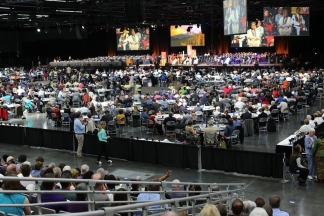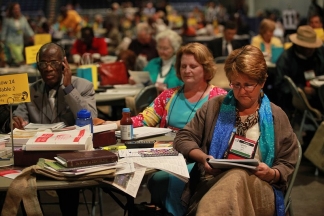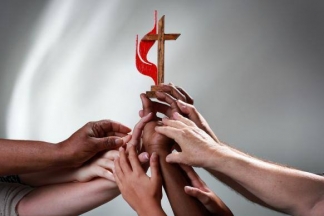news article
Bishop Webb educates UNY on what to expect at the Special Session of General Conference
December 5, 2018 / By Shannon Hodson / .(JavaScript must be enabled to view this email address)
Forty-six years—that is how long the debate on human sexuality has been taking place in the United Methodist Church. The 2016 General Conference gave a specific mandate to the Council of Bishops to lead The United Methodist Church in discerning and proposing a way forward through the present impasse related to human sexuality and the consequent questions about unity and covenant.
After this mandate was given, the Council of Bishops called for a Special Session of General Conference to be held Feb. 23-26, 2019 in St. Louis, Mo. and appointed laity and clergy across the United Methodist Church to form a 32-member Commission on a Way Forward. This Commission was put in charge of creating a report of recommendations to present to the Special Session of General Conference.
After over a year of meetings and collaboration, the Commission on a Way Forward presented a report to the Council of Bishops in May of 2018 with two possible recommendations to present at the Special Session of General Conference. These plans included: The One Church Plan, The Connectional Conference Plan. The Council of Bishops then asked for the Traditionalist Plan, which was an option in an earlier draft of the report to be added back into the report, leaving three possible Church models.
This past fall, Upper New York (UNY) Area Resident Bishop, Mark J. Webb held six regional gatherings across UNY in preparation for Special Session of General Conference to talk about the report of the Commission on a Way Forward for The United Methodist Church.
Delving into the significance of the 2019 Special Session of General Conference
Bishop Webb started each gathering by educating the attendees about the 2019 Special Session of General Conference, explaining that the United Methodist Church has a legislative body, an executive body, and a judicial body. He further explained that the General Conference is the legislative body and that “it is the only body that can officially speak for the United Methodist Church.” The General Conference is the only body that can change the language in the Book of Discipline.
The executive body is the Council of Bishops. They can call for Special Sessions of General Conference outside of the normal every-four-year schedule. These are called adjourned sessions and such a session has only been held one other time in the history of the United Methodist Church. Bishop Webb acknowledged that what this means is that “We are in a historic time in that an adjourned session of General Conference is not a frequently used vehicle.”
The Judicial Body is like the United States Supreme Court—they can decide the constitutionality of items presented by or to the Council of Bishops.
Bishop Webb then clarified the fact that the delegates for the 2019 Special Session of General Conference are the same delegates that were elected for the 2016 session of General Conference, except for those Annual Conferences that decided to elect new delegates for the Special Session. Upper New York delegation will include the 12 delegates who were elected for the 2016 General Conference, six clergy and six laity. Bishop Webb said, “The Special Session of General Conference will discuss, debate, and vote on the report on the Commission on the Way Forward and Bishops do not participate in debate or vote at General Conference. Bishops do not speak or vote—we preside. Debating and voting is the role of the delegates.”
Outlining the report to be presented at the Special Session of General Conference
Bishop Webb explained that the One Church Model, “provides a form of unity that gives Conferences, churches, and pastors the flexibility to uniquely reach their missional context without disbanding the connectional nature of The United Methodist Church.” The One Church plan would allow churches and Conferences to decide whether to perform same-gender marriages, and Bishops will have the freedom to decide whether to ordain practicing lesbian, gay, bisexual, transgendered and queer persons.
The One Church Plan would allow elders to transfer churches or Conference if they are not in agreement with the church’s or Conference’s stance. In other words, all appointments are guaranteed despite their stance. If clergy decide to leave the denomination, they will be given what they already have vested in their retirement, but no more.
Bishop Webb used an analogy of an umbrella to describe the Connectional Conference Plan. He said, “The Connectional Conference plan creates this big umbrella that reflects a unified core that includes shared name, logo, doctrine and services, but under this umbrella, the Connectional Conference creates three values-based Connectional Conferences that have distinctive definitions of accountability, contextualization and justice.”
The Connectional Conference plan allows various parts of the UMC to follow their understandings of human sexuality without breaking unity completely by forming three Connectional Conferences: Traditional, Unity and Progressive. Current US Jurisdictional Conferences would be replaced with three connectional conferences, each covering the whole country, based on theology including perspectives on LGBTQ ministry (i.e. progressive, unity, and traditional). Each Connectional Conference could have its own Book of Discipline. Each Connectional Conference could also have its own policies regarding LGBTQ weddings and ordination and could set its own standards for ministerial credentialing and list of approved schools/seminaries.
The Traditionalist Plan maintains the current language and stance of the Book of Discipline. However, it allows Annual Conferences or any group of 50 congregations to form a self-governing church if they are in “irreconcilable conflict for reasons of conscience with the doctrine or moral teachings and requirements of The Book of Discipline on the issues of human sexuality.
At it’s most recent gathering in October, the Judicial Council ruled that both the One Church Plan and the Traditionalist Plan contain provisions that have constitutional problems. Proponents of each plan are working to correct those constitutional issues.
Praying beyond Feb. 23-26
Bishop Webb said, “We need to be praying for February 23 through 26, but do you know the date that I am more interested in?…February 27th, February 28th, and March 1st because no matter what happens at this Special Session of General Conference, there is one thing that does not change and that is that the Church of Jesus Christ continues and the mission that the Church of Jesus Christ is called to, continues; and we will still have ministry to do in the name of Jesus.”
Bishop Webb affirmed that no matter how the United Methodist Church changes, he will continue to equip leaders to help their congregations become disciples of Jesus Christ for the transformation of the world.”
Each gathering included worship and deep prayer for all the congregations of UNY, the delegates who will be attending Special Session of General Conference, for all leaders both clergy and laity, and God’s direction and provision. Each gathering also included laying of the hands, on delegates attending Special Session.
Continue to pray for the United Methodist Church as we approach February 23.
If you missed these regional gatherings and would like to engage in conversations within your congregation or with various congregations in your District, click here to see a four-part video series about Special Session, featuring Bishop Webb. Click here to see a comprehensive list of FAQs related to the Special Session of General Conference.